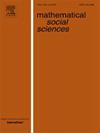关于损失厌恶的跨期偏好的注释
IF 0.7
4区 经济学
Q4 ECONOMICS
引用次数: 0
摘要
我们研究了两种表现损失厌恶的跨期偏好模型:一种基于相对于参考点的效用变化,另一种包含心理调整成本。在多周期(可能是无限视界)框架内,我们证明了这两个公式在理论上是等价的。得到的首选项一般既不是单调的,也不是凹的。我们得到了单调性和凹性的充分必要条件,并给出了一个保持等价的连续时间扩展。我们的结果为参考依赖偏好下的跨期行为建模提供了一个易于处理和严格的基础。本文章由计算机程序翻译,如有差异,请以英文原文为准。
Note on intertemporal preference with loss aversion
We study two models of intertemporal preferences exhibiting loss aversion: one based on utility changes relative to a reference point, and another incorporating mental adjustment costs. Within a multi-period (possibly infinite-horizon) framework, we show that the two formulations are theoretically equivalent. The resulting preferences are neither monotone nor concave in general. We derive necessary and sufficient conditions for monotonicity and concavity, and provide a continuous-time extension that preserves the equivalence. Our results offer a tractable and rigorous foundation for modeling intertemporal behavior under reference-dependent preferences.
求助全文
通过发布文献求助,成功后即可免费获取论文全文。
去求助
来源期刊

Mathematical Social Sciences
数学-数学跨学科应用
CiteScore
1.30
自引率
0.00%
发文量
55
审稿时长
59 days
期刊介绍:
The international, interdisciplinary journal Mathematical Social Sciences publishes original research articles, survey papers, short notes and book reviews. The journal emphasizes the unity of mathematical modelling in economics, psychology, political sciences, sociology and other social sciences.
Topics of particular interest include the fundamental aspects of choice, information, and preferences (decision science) and of interaction (game theory and economic theory), the measurement of utility, welfare and inequality, the formal theories of justice and implementation, voting rules, cooperative games, fair division, cost allocation, bargaining, matching, social networks, and evolutionary and other dynamics models.
Papers published by the journal are mathematically rigorous but no bounds, from above or from below, limits their technical level. All mathematical techniques may be used. The articles should be self-contained and readable by social scientists trained in mathematics.
 求助内容:
求助内容: 应助结果提醒方式:
应助结果提醒方式:


